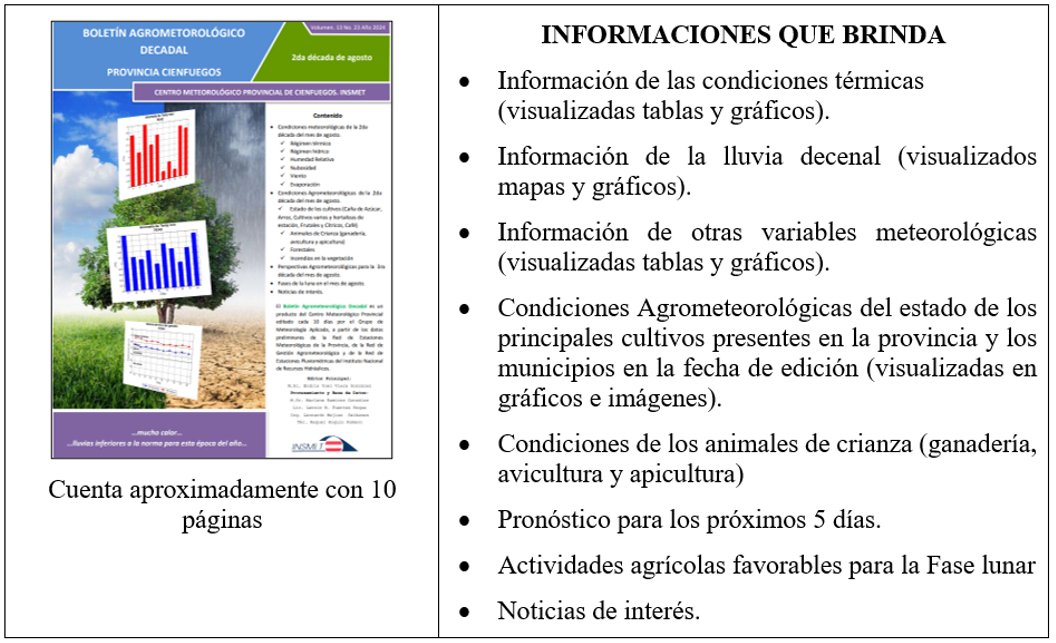Implementation of climate services in the agricultural sector and its contribution to decision-making
Main Article Content
Abstract
The climate is a crucial factor for the life and livelihood of all human beings and for development as a whole. Throughout history, society has had to face climate variability, particularly extreme atmospheric and climatic phenomena, but climate change represents a new and larger challenge. Thus, the adoption of climate services as scientific tools to address the challenges posed by climate in any sector of society becomes evident. These services encompass many products that facilitate the generation and provision of information based on past, present, and future climate, as well as its impacts on natural and human systems. Agriculture is one of the most vulnerable economic sectors to climate variability and change; therefore, the general objective of this research was to implement climate services focused on the Global Framework for Climate Services in the agricultural sector of the province of Cienfuegos and its contribution to decision-making. Services were implemented tailored to the needs of each user. To assess user satisfaction, a survey was conducted that yielded entirely positive feedback, surpassing the results of previous research in the province and qualitatively demonstrating how beneficial climate information can be for users' understanding in making informed decisions to adapt to and mitigate climate variability and change.
Downloads
Article Details

This work is licensed under a Creative Commons Attribution-NonCommercial 4.0 International License.
Those authors who have publications with this journal accept the following terms of the License Attribution-NonCommercial 4.0 International (CC BY-NC 4.0):
You are free to:
- Share — copy and redistribute the material in any medium or format
- Adapt — remix, transform, and build upon the material
The licensor cannot revoke these freedoms as long as you follow the license terms.
Under the following terms:
- Attribution — You must give appropriate credit, provide a link to the license, and indicate if changes were made. You may do so in any reasonable manner, but not in any way that suggests the licensor endorses you or your use.
- NonCommercial — You may not use the material for commercial purposes.
- No additional restrictions — You may not apply legal terms or technological measures that legally restrict others from doing anything the license permits.
The journal is not responsible for the opinions and concepts expressed in the works, they are the sole responsibility of the authors. The Editor, with the assistance of the Editorial Committee, reserves the right to suggest or request advisable or necessary modifications. They are accepted to publish original scientific papers, research results of interest that have not been published or sent to another journal for the same purpose.
The mention of trademarks of equipment, instruments or specific materials is for identification purposes, and there is no promotional commitment in relation to them, neither by the authors nor by the publisher.
References
Barcia, S., Gómez, D., Viera, E. Y., Fuentes, L. B., Mejías, L., & Angulo, R. A. (2024). Distribución espacial de la precipitación en la provincia de Cienfuegos. Revista Cubana de Meteorología, 30(4).
Barcia, S., Viera, E. Y., Gómez, D., Fuentes, L. B., Porres, M. A., Mejías, L., & Angulo, R. A. (2023). Distribución espacial de la temperatura del aire en la provincia de Cienfuegos. Revista Cubana de Meteorología, 29(3), 1-20. http://rcm.insmet.cu/index.php/rcm/article/view/797/1477
Carr, E., R., & Onzere, S. N. (2017). Really effective (for 15% of the men): Lessons in understanding and addressing user needs in climate service from Mali. Climate Risk Management, 1-14. https://www.researchgate.net/publication/315317775_Really_Effective_for_15_of_the_men_Lessons_in_Understanding_and_Addressing_User_Needs_in_Climate_Services_from_Mali
CITMA. (2021). Estrategia Ambiental Territorial, 2021-2030. Centro Meteorológico Provincial de Cienfuegos.
García, M. (1993). La Encuesta. En El análisis de la realidad social. Métodos y técnicas de investigación. Alianza Editorial S. A., 123-152. http://metodo1.sociales.uba.ar/wp-content/uploads/sites/164/2014/10/Garcia-et-al-El-analisis-de-la-realidad-social-metodos-y-tecnicas-de-la-investigacion.pdf
OMM. (2011). Del conocimiento climático a la acción: Marco Mundial para los Servicios Climáticos-Potenciar la capacidad de los más vulnerables. (No 1065; pp. 1-251). Organización Meteorológica Mundial. https://library.wmo.int/doc_num.php?explnum_id=5093
OMM. (2018a). Fortalecimiento de los servicios climáticos para el sector de la seguridad alimentaria (Boletín de la OMM No 67; pp. 20-26). OMM. https://dialnet.unirioja.es/servlet/articulo?codigo=6884126
OMM. (2018b). El Proyecto Climandes: compartiendo experiencias en el diseño de servicios climáticos adaptados a los usuarios (Boletín de la OMM No 67; pp. 27-32). OMM. https://dialnet.unirioja.es/servlet/articulo?codigo=6884127
ONEI. (2016). Anuario Estadístico de Cienfuegos 2015. ONEI. http://www.onei.gob.cu/sites/default/files/anuario_est_provincial/00cienfuegos.pdf
ONEI. (2020). Anuario Estadístico de Cienfuegos 2019. ONEI. http://www.onei.gob.cu/sites/default/files/anuario_est_provincial/00_anuario_estadistico_de_cienfuegos_2019_.pdf
ONEI. (2021). Anuario Estadístico de Cienfuegos 2020. https://www.onei.gob.cu/sites/default/files/publicaciones/2022-03/AEP%20 Cienfuegos.pdf
Tall, A. (2013). ¿Qué entendemos por servicios climáticos? (Boletín de la OMM 62 Número Especial; pp. 7-11). OMM. https://repositorio.aemet.es/bitstream/20.500.11765/3787/1/BolOMM%2062_especial-1.pdf
Viera, E. Y. (2022). Los servicios climáticos como herramienta para el Manejo Integrado de Zonas Costeras. [Maestría]. Universidad de Cienfuegos.
Viera, E. Y., & Barcia, S. (2020). Los servicios climáticos en la zona costera de la provincia Cienfuegos. Revista Cubana de Meteorología, 26(4), 1-14. http://rcm.insmet.cu/index.php/rcm/article/view/530/933

